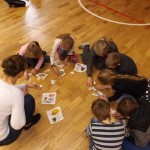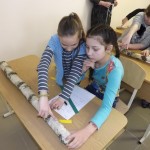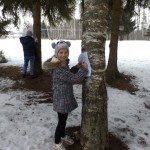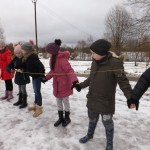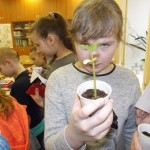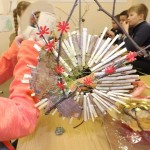Natural sciences camp “long bean” at the Tiskad High School
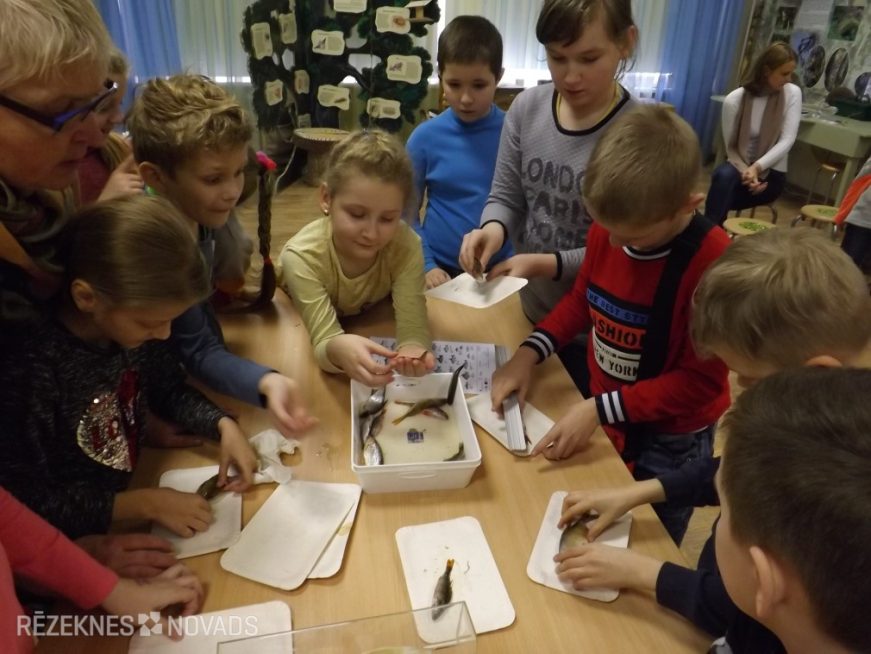
In the framework of project No. 8.3.2.2/16/I/001 “Support for the development of individual competencies” from 12 March to 14 March 2018, the Natural Science Day camp “long beat” in classes 1-6 was held at the High School.
During the camp, research and creative activities were organised for children, which took place both by class groups and all pupils together.
The morning began with a fun morning show where the children were delighted.
In the theoretical practice session of the first day, “tree world” pupils developed the skills to recognize trees by appearance at different seasons, presenting the diversity of tree species in Latvia, their appearance and recognition. Developed communication and collaboration skills by working in practical groups: the recognition of trees by appearance, leaves, fruit, composition of tree images from different parts.
In the practice “measuring skills”, pupils experienced knowledge of measuring units and types in the past and now. After demonstrating “what units of measurement were used in the past”, pupils learned how to measure plant models and how to measure plants in nature. During the conversation, it was revealed that the old units were still in use in families.
In the practice “measuring the tree model”, pupils applied different types of measurement (with elbows, sprinkles, meditation), measuring the tree model, thus reinforcing the skills to perform measurements with different measuring techniques.
After lunch, pupils went out to use different measuring techniques in nature. The pupils surveyed the camp area, recognizing the tree species. The tree was selected, and various types of measurements were carried out to determine the height of the tree, the age, the circumference of the trunk, the colour of the tree skin and other signs. At the end of the lesson, the children drew their tree. Discussions in the form of discussions discussed the value of trees and forests and their preservation. The pupils were proud of the fact that they were actively participating in the collection and thus retain a tree.
In the day of the day, pupils participated in sports activities with toy elements where the knowledge of trees had to be used (Challenges, names of different trees, felling of tree seeds, etc.).
The result of the day's evaluation was friendly. The pupils were divided into three beans, which had to be glued to the activity that was most liked. There was a number of beans around each activity.
The second day of the camp began with morning passion – thoughts and body.
After breakfast, pupils went to the research activity “chocolate secrets” where a virtual excursion in tropical forests was offered to identify the conditions of growth of cocoa trees.
In the second part of the lesson, the children studied chocolate composition, knew and analysed the substances in the article. The schoolchildren of the younger classes were first in the role of researchers and how the scientists dissolved the pieces of different chocolate types in the tubes, watching, studying and wondering. Working in groups and pairs, they knew the effects of chocolate on human health and mood.
The study visit to the Nature Education Centre “Razna” was for the first time. A photo exhibition on Razna Lakes and a drawing exhibition on the autumn hills could be seen at the premises of the former school. In the Centre's building, pupils took part in the activities of fish species, where both fish skeletons, books on fish, creative games and live fish were used. With great interest, the children studied the appearance, the structure, the fineness of the fin, and counted the number of years after the scales. At the end of the lesson it was revealed that the children knew a lot of fish living in Razna Lake.
At the end of the day, the children, with great enthusiasm, discussed what they had seen, trying to beat each other in the knowledge of the fish world.
On the third day of the camp, children went to practical research on “plant microworld”. Most students had their first meeting with the microscope. The pupils met the microscope structure, learned to prepare micro-preparations for work, got the skills to work with microscopes, carried out a study to find out the internal structure of plants. A study was carried out – the comparison of the onion bark, the structure of the plant leaf, the appearance and the characteristics of them. With great interest, the pupils changed each other to look at microscopes, as each of them separated. A large delight was caused by the blue onion skin, which looked like a beautiful precious stone beneath the microscope.
A week before the camp, the children planted a beans. At the end of the lesson, the weighing and measuring of the beans took place. The results were different, with some beans reaching up to 15 cm.
The next lesson took place outside: the fun-looking “long bean”. Individual parts of the card were given to the pupils groups by station labels, visiting all points, replacing the separate parts and placing the card. In each station, children had to solve a variety of fun tasks, recognize objects with the purpose of determining the direction and distance of the next point. There was a fun surprise at the end of each group. The performance of this activity contributed to the development of students' research skills, interest and skills in the immediate vicinity, developed skills to cooperate and work in the group.
After lunch, the children went to the creative workshop “wood fantasy works.” The pupils produced a variety of spatial articles: cannabis from wood, frames and room decorations. All jobs were placed in the school lobby so that the other school pupils could look at the creative works.
In one of the last classes of sports activity, the children struggled with a true spirit of struggle, transforming the swamp, leaning between the trees of low trees and breaking each other into a masterpiece.
At the end of the camp, the pupils filled out questionnaires with questions about camp. The conclusions did not disappoint, as they were all satisfied and expressed their willingness to participate in such camps.
Camp manager Renata Sticane
